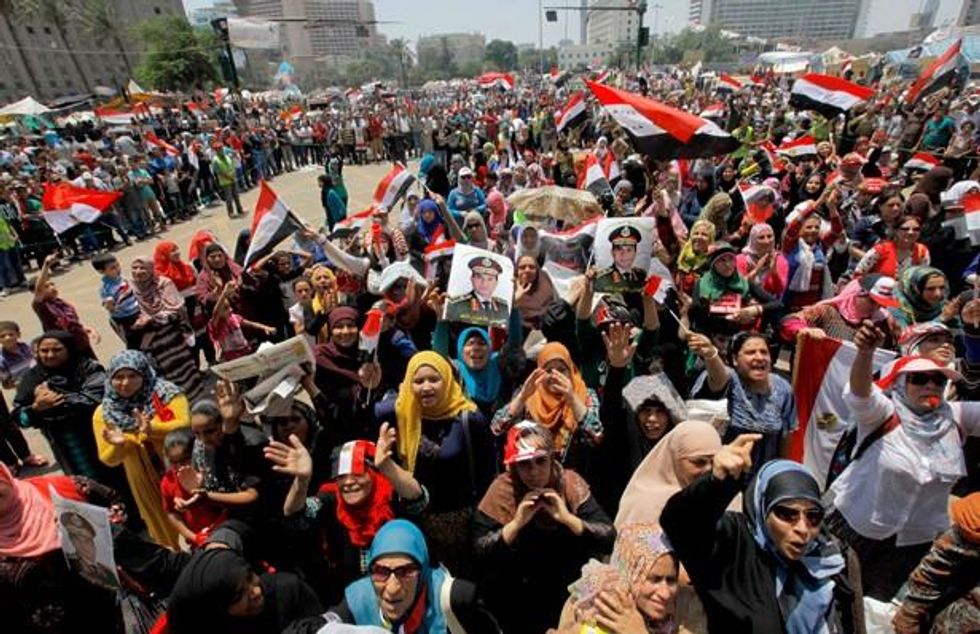

SUBSCRIBE TO OUR FREE NEWSLETTER
Daily news & progressive opinion—funded by the people, not the corporations—delivered straight to your inbox.
5
#000000
#FFFFFF
To donate by check, phone, or other method, see our More Ways to Give page.


Daily news & progressive opinion—funded by the people, not the corporations—delivered straight to your inbox.
Last Wednesday, the world watched an increasingly familiar scene: Egyptian crowds gathering in Tahrir Square to demand social change. Once the army announced it had ousted President Mohamed Morsi, these same streets became host to victory celebrations for some, and violent conflict for others.

In many ways, the attack against these women is part of a global rape culture in which women's bodies are used as tools of war and targets during social unrest. During the Egyptian Revolution of 2011, for example, it was widely documented that the Mubarak regime paid men to systematically sexually assault women during the demonstrations.
But this recent wave of rape is part of another frightening reality: women's bodies are also casualties of "freedom."
In an e-mail, Rebecca Chiao, the co-founder of HarrassMap Egypt, a group that rescues women being sexually assaulted by mobs in the recent protests, wrote, "Whoever is at fault for paying thugs, no political actors have made a serious effort to punish or prevent mob harassment/assault/rape."
Regine Jean-Charles, author of Conflict Bodies: The Politics of Rape Representation in the Francophone Imaginary, told me in a phone interview that this insidious response is "not new" but consistent with "a global pattern of social movements not including ending gender-violence in their liberatory visions."
Even in our own Occupy Wall Street movement, women were subject to sexual assaults and misogynist jokes.
Real social change must include eradicating rape culture. Until then, as women continue to be on the frontlines of protests--be it in New York City or Cairo--with our political brethren, our bodies, our rights and ultimately our lives remain on freedom's sidelines.
Dear Common Dreams reader, The U.S. is on a fast track to authoritarianism like nothing I've ever seen. Meanwhile, corporate news outlets are utterly capitulating to Trump, twisting their coverage to avoid drawing his ire while lining up to stuff cash in his pockets. That's why I believe that Common Dreams is doing the best and most consequential reporting that we've ever done. Our small but mighty team is a progressive reporting powerhouse, covering the news every day that the corporate media never will. Our mission has always been simple: To inform. To inspire. And to ignite change for the common good. Now here's the key piece that I want all our readers to understand: None of this would be possible without your financial support. That's not just some fundraising cliche. It's the absolute and literal truth. We don't accept corporate advertising and never will. We don't have a paywall because we don't think people should be blocked from critical news based on their ability to pay. Everything we do is funded by the donations of readers like you. Will you donate now to help power the nonprofit, independent reporting of Common Dreams? Thank you for being a vital member of our community. Together, we can keep independent journalism alive when it’s needed most. - Craig Brown, Co-founder |

In many ways, the attack against these women is part of a global rape culture in which women's bodies are used as tools of war and targets during social unrest. During the Egyptian Revolution of 2011, for example, it was widely documented that the Mubarak regime paid men to systematically sexually assault women during the demonstrations.
But this recent wave of rape is part of another frightening reality: women's bodies are also casualties of "freedom."
In an e-mail, Rebecca Chiao, the co-founder of HarrassMap Egypt, a group that rescues women being sexually assaulted by mobs in the recent protests, wrote, "Whoever is at fault for paying thugs, no political actors have made a serious effort to punish or prevent mob harassment/assault/rape."
Regine Jean-Charles, author of Conflict Bodies: The Politics of Rape Representation in the Francophone Imaginary, told me in a phone interview that this insidious response is "not new" but consistent with "a global pattern of social movements not including ending gender-violence in their liberatory visions."
Even in our own Occupy Wall Street movement, women were subject to sexual assaults and misogynist jokes.
Real social change must include eradicating rape culture. Until then, as women continue to be on the frontlines of protests--be it in New York City or Cairo--with our political brethren, our bodies, our rights and ultimately our lives remain on freedom's sidelines.

In many ways, the attack against these women is part of a global rape culture in which women's bodies are used as tools of war and targets during social unrest. During the Egyptian Revolution of 2011, for example, it was widely documented that the Mubarak regime paid men to systematically sexually assault women during the demonstrations.
But this recent wave of rape is part of another frightening reality: women's bodies are also casualties of "freedom."
In an e-mail, Rebecca Chiao, the co-founder of HarrassMap Egypt, a group that rescues women being sexually assaulted by mobs in the recent protests, wrote, "Whoever is at fault for paying thugs, no political actors have made a serious effort to punish or prevent mob harassment/assault/rape."
Regine Jean-Charles, author of Conflict Bodies: The Politics of Rape Representation in the Francophone Imaginary, told me in a phone interview that this insidious response is "not new" but consistent with "a global pattern of social movements not including ending gender-violence in their liberatory visions."
Even in our own Occupy Wall Street movement, women were subject to sexual assaults and misogynist jokes.
Real social change must include eradicating rape culture. Until then, as women continue to be on the frontlines of protests--be it in New York City or Cairo--with our political brethren, our bodies, our rights and ultimately our lives remain on freedom's sidelines.